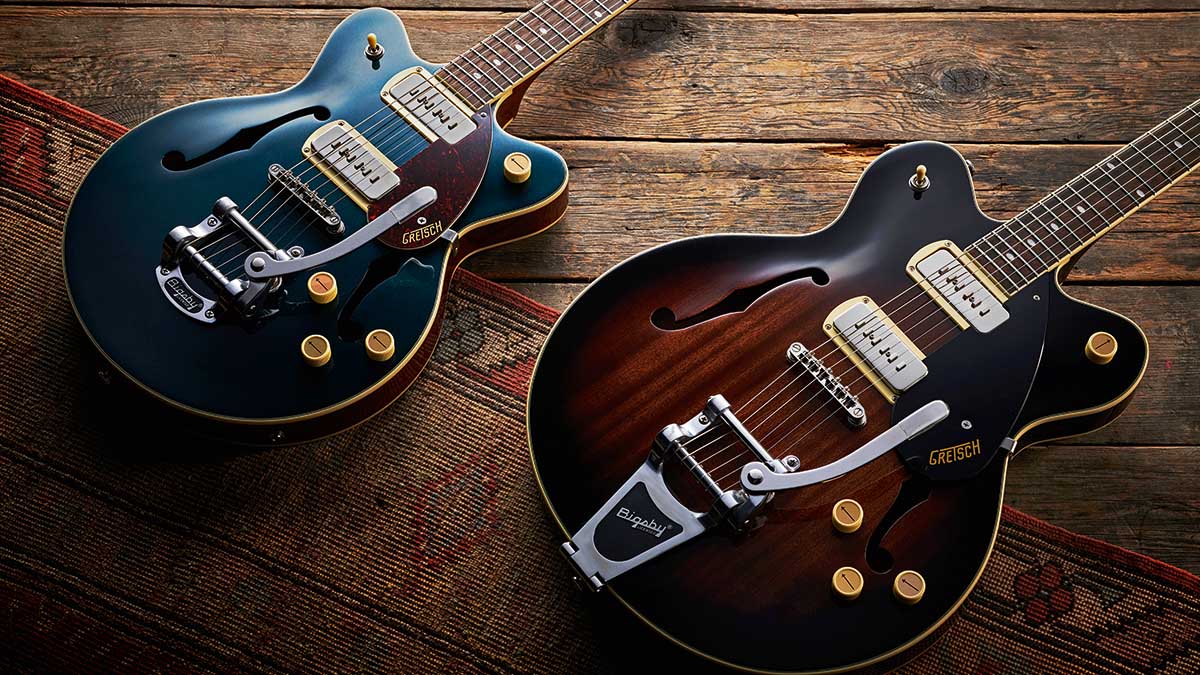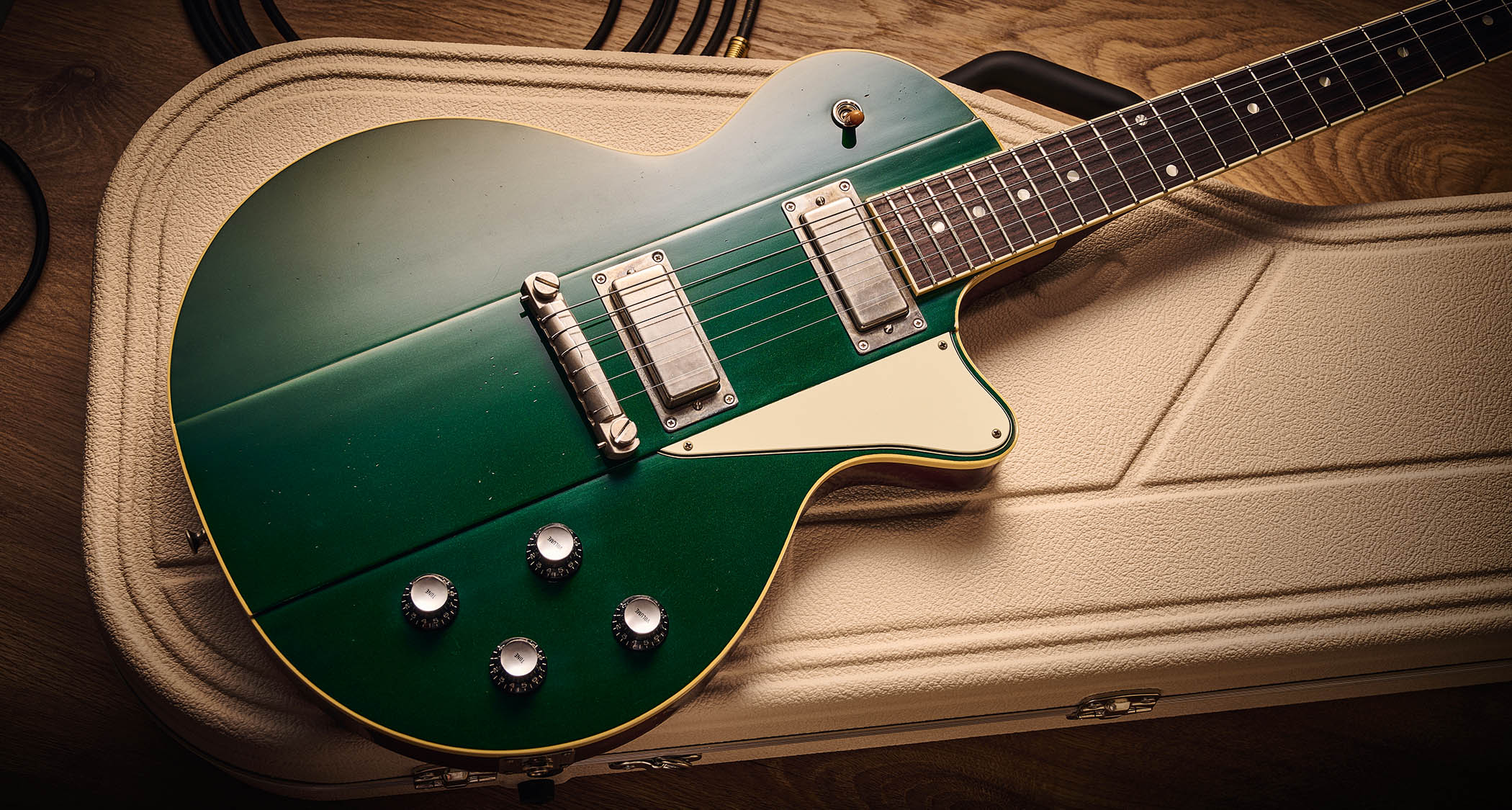Guitar World Verdict
These very tidy-for-the-money lightweight thinlines move effortlessly from pretty jazzy-sounding cleans to surprisingly muscular bluesy, rootsy grit with overdrive. Add in those Bigsbys and a little musical feedback and you’re off. Huge potential from a far from huge outlay.
Pros
- +
Tidy build and classy style.
- +
The FideliSonic 90s bring a new voice to the Gretsch range.
- +
Excellent supplied setup and playability.
- +
Works well with lighter gains.
- +
G2655 has tighter low-end and little more focus.
Cons
- -
Might simply be too mellow-sounding for some.
- -
Lacking a bit of that classic Gretsch bite and sparkle.
You can trust Guitar World
Despite an aesthetic that takes us right back to the birth of rock ’n’ roll, Gretsch is a surprisingly innovative maker of electric guitars.
What are we saying? Okay, the pictures of our review pair look pretty retro, but under the hood there’s plenty going on to indicate that Gretsch is far from a backward-looking heritage brand just putting out reruns of its past glories.
And these are the lowly Streamliners that, as Gretsch’s product manager Adam Bowden-Smith explains, are “not just the entrance into the Gretsch world but also the Gretsch guitar for people who haven’t thought of owning a Gretsch guitar before. They do the Gretsch sound, but also all the other sounds you might want out of that style of guitar.”
More from Adam later on. Four of the new 2021 models – the Bigsby-equipped G2622T-P90 and G2655T-P90 that we have on review, which are also available with hardtail V-Stoptail options – feature a new pickup design, the FideliSonic 90 single coil, which outwardly looks like a ‘staple’ magnet P-90.
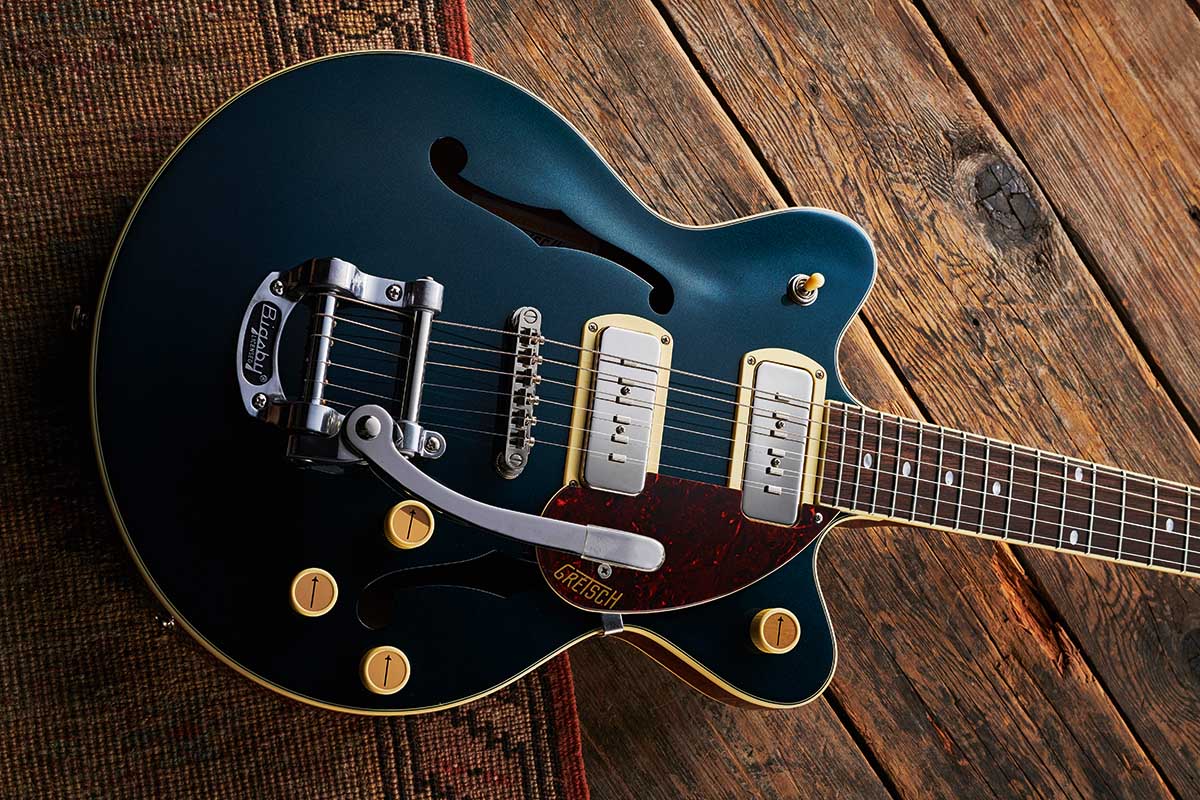
These new pickups have nickel-plated covers with pretty large surrounding cream plastic ‘bezels’ (purely for looks) and give this foursome a different aesthetic to the more regular Gretsch Broad’Tron humbuckers, or the more standard P-90 single coils of other Streamliners.
Yet the fundamental difference of these guitars are their chambered centre blocks, which create a very different guitar from the original-style hollowbodies. They’re installed in the larger 406.4mm (16-inch) wide 2622 and the smaller Junior-style 355.6mm (14-inch) wide 2655.
Now, the Streamliners are made in Indonesia and, as we only recently reported with our review of the G2215 P90 Streamliner Jr Jet, the build is really very tidy. The finish does appear on the thick side and is a little too shiny, but the colour choice on both is good. The 2655 goes for a snappy two-tone style with three top colours: Mint Metallic, Sahara Metallic and our more muted Midnight Sapphire metallic, all with the same Vintage Mahogany Stain to the back, sides and neck.
All the latest guitar news, interviews, lessons, reviews, deals and more, direct to your inbox!
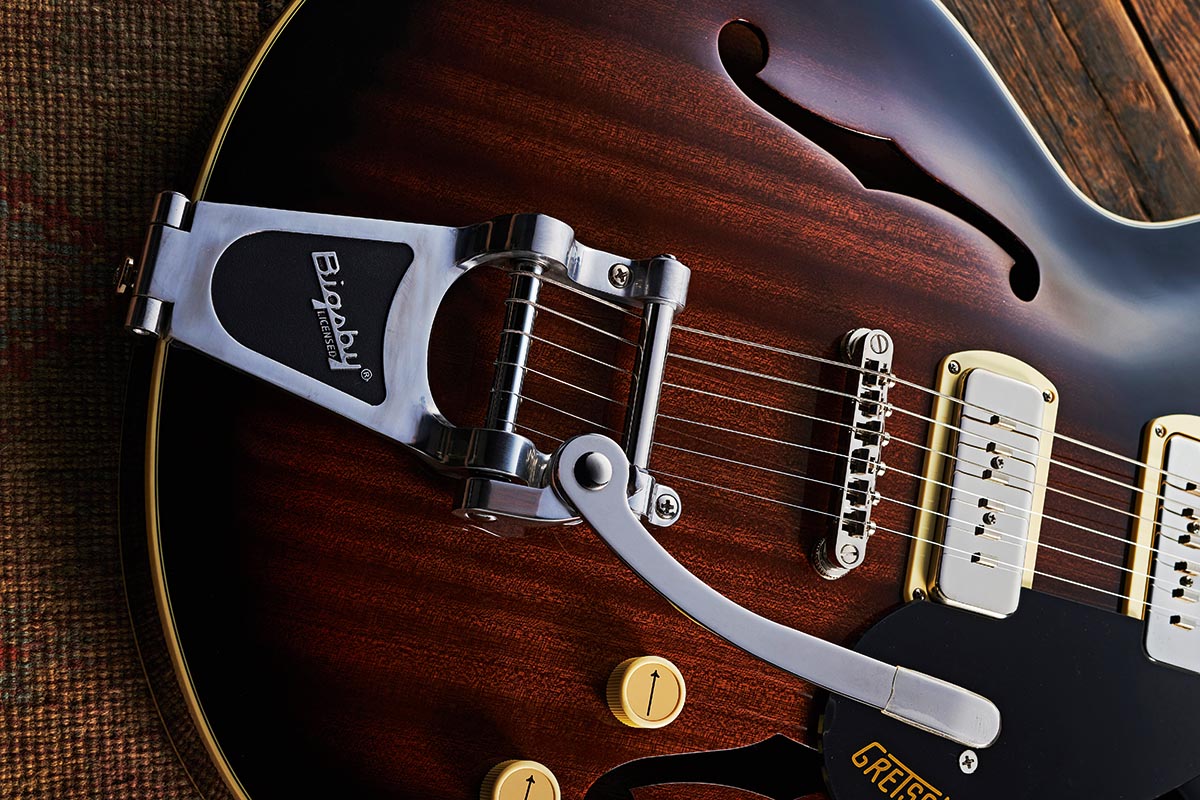
The 2622’s options are all-over and rather more dowdy colours: our lightly ’bursted Brownstone is joined by another brown, Forge Glow (both with black pickguards), while the third option is a dark grey-ish Gunmetal with a tortoise pickguard.
These more muted colours seem to reinforce the different Streamliner style, which is less showy than classic Gretsch. Size and colour aside, they share more than just their pickups. Unlike other Streamliners, they use laminated mahogany (actually sapele, confirms Adam), instead of maple, for the bodies, and on our larger G2622 it’s noticeably striped, recalling the classic Guild Starfire semis.
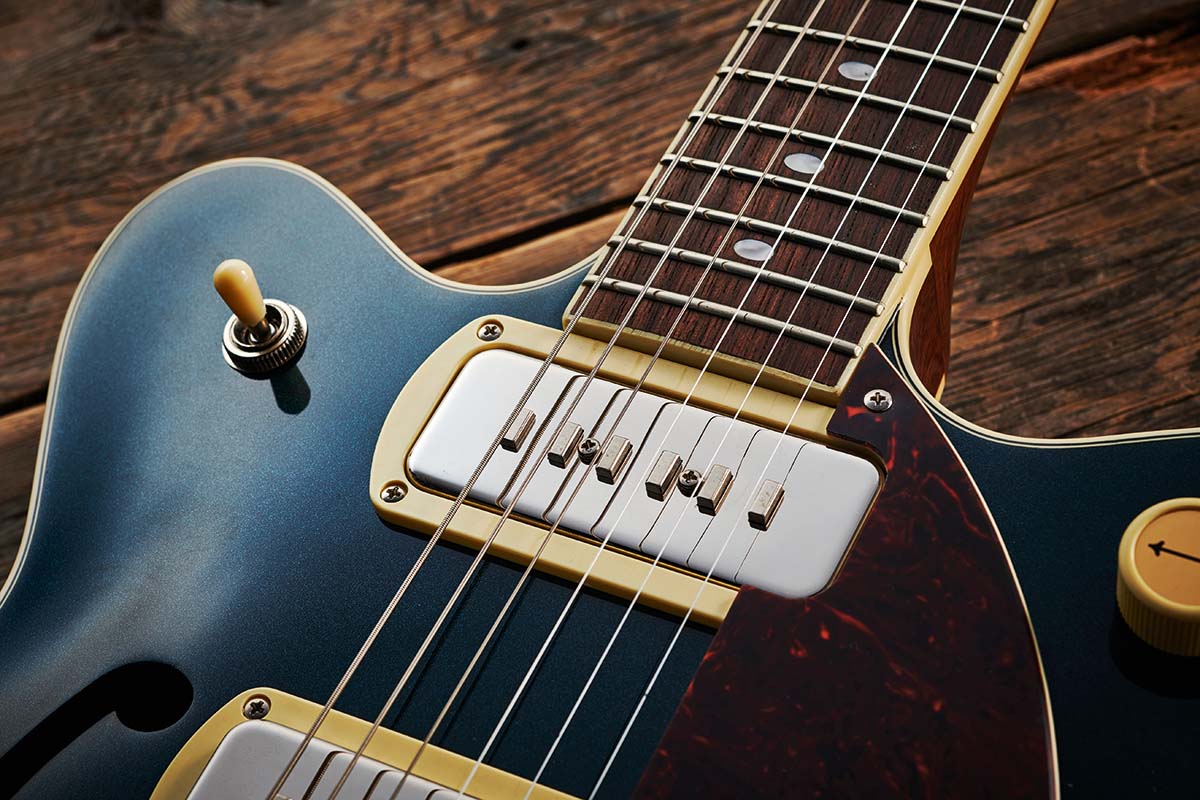
Through the unbound f-holes you can see the tidily kerfed linings of the quite traditional construction. That chambered centre block is spec’d as spruce, but looks more like the light-coloured nato that’s also used for the necks (which have a spliced headstock), both with a dark laurel fingerboard with small oval inlays and single cream binding; it also extends around the large three-a-side headstock.
Both bodies are bound, too, the top edges with an inner purfling strip. Hardware is consistent across both models with those pretty generic enclosed tuners, a synthetic bone nut and an ‘Adjusto-Matic’ tune-o-matic bridge with handy-for-height adjustment slot-head posts.
Our smaller guitar features a ‘horse-shoe’ B50 licensed Bigsby; our larger guitar goes for the longer-tailed B70. Should we get excited by control knobs? Well, we kind of do here. These all-new “radio arrow” knobs are perfectly named, the sort of things you’d use to tune in the BBC World Service back in the day.
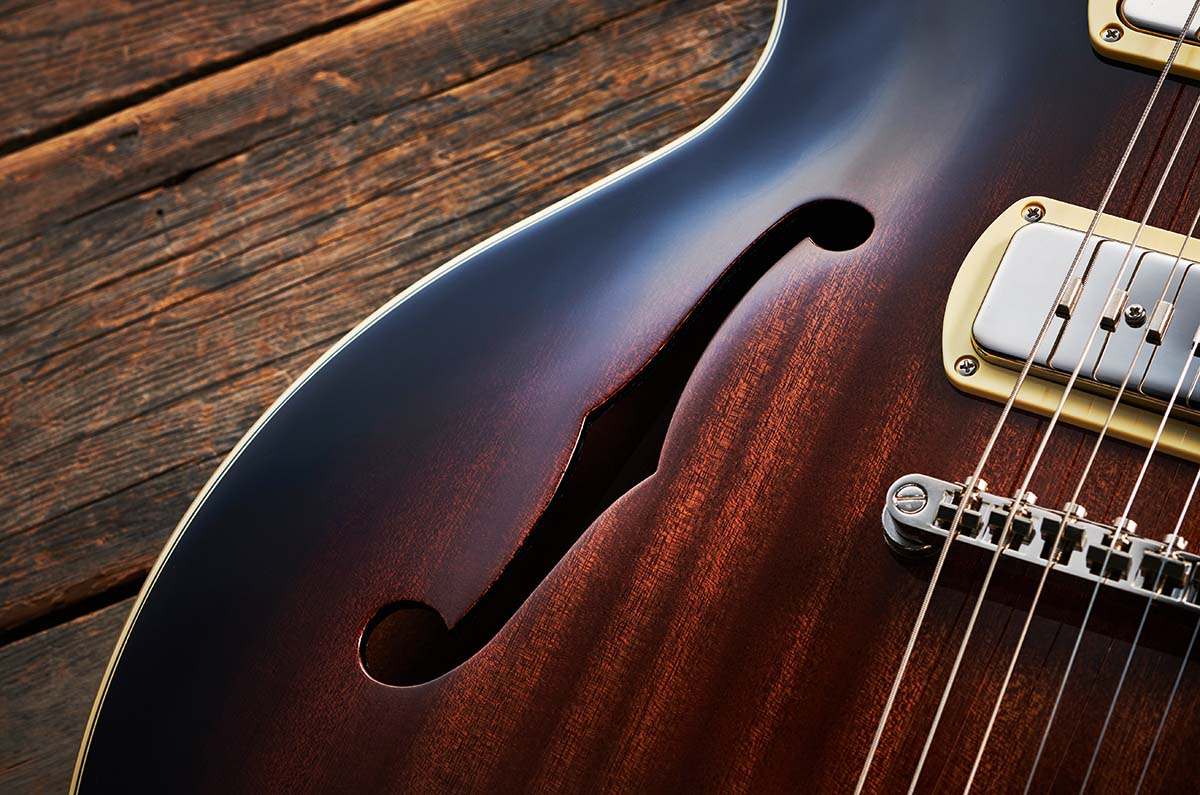
Feel & Sounds
Classic-sized centre-blocked semis can be surprisingly heavy, but that’s not’s the case here with our larger 2622 coming in at 3.19kg (7.02lb) and our smaller 2655 obviously lighter at 2.85kg (6.27lb). The larger guitar has its upper strap button on the bass-side horn and feels very comfortable and balanced strapped on.
The smaller G2655’s upper strap button is on the base of the heel, which slightly tips the guitar forward, but, again, there’s no neck dive with a lightly textured strap, and the more compact feel of the guitar makes it very manageable. Seated, it feels much more like a solidbody.
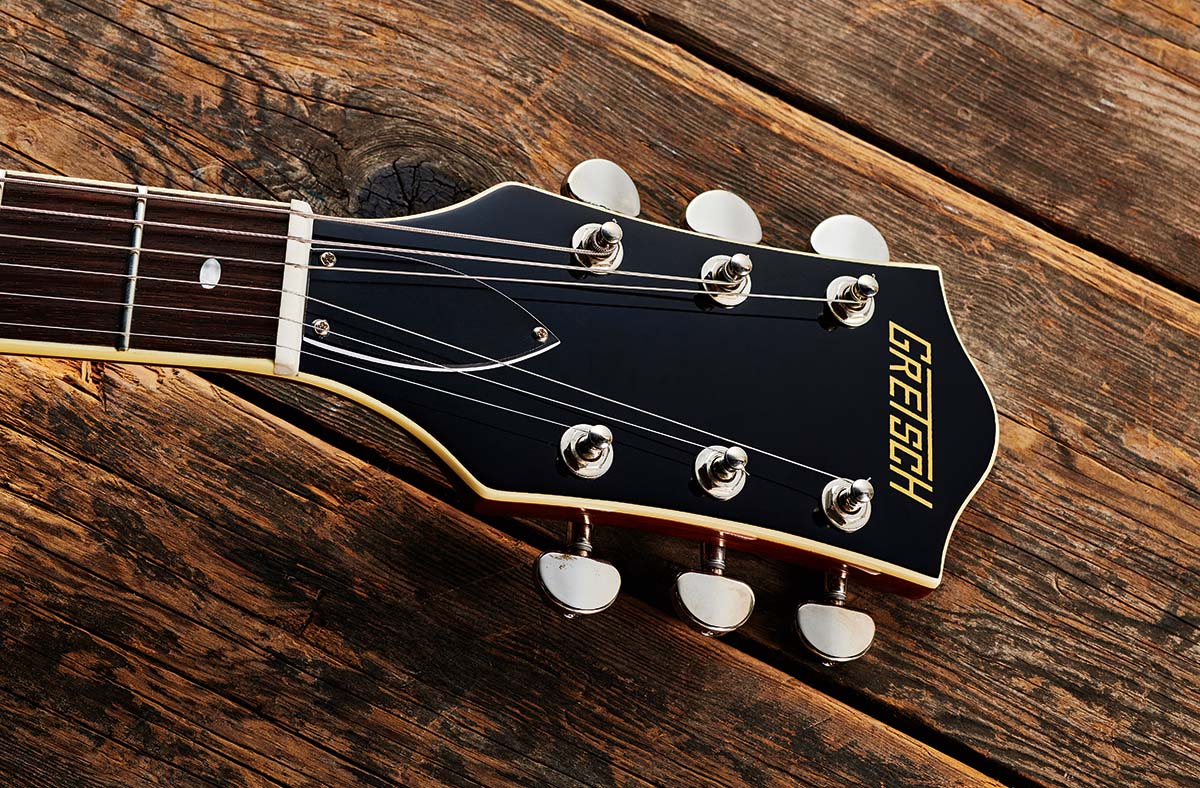
There’s very little difference between the neck shapes: both are spec’d as having a “Thin U”, which suggests a thin neck with quite square shoulders. In reality, both models have what we’d call a comfortable C profile. They are pretty much bang-on 43mm at the nut on with a depth of 21.3mm at the 1st fret filling out to 24.4mm by the 12th on the 2622 and slightly slimmer at 23.6mm on the 2655.
The frets aren’t over-high with a good width (approximately 2.64mm wide by 1mm high) and setups are nicely dialled in with a low string height at the 12th of 1.3mm on the high E and 1.5mm on the low E. Fret tops and ends are nicely fettled, and the nuts are properly cut, but we do have good ol’ Bigsbys here.
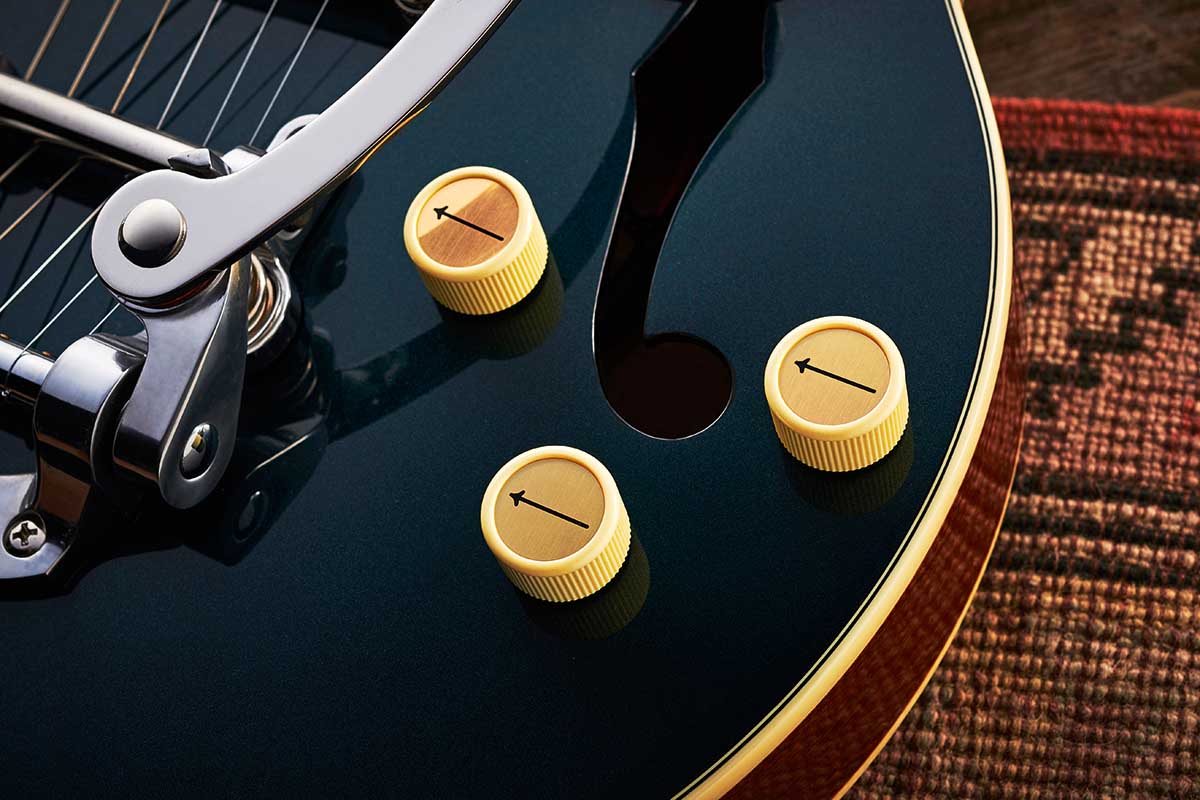
Both feel a little stiff, but after string stretching, tuning stability is pretty much spot on, with the usual caveat that these are designed for light shimmers. Both instruments have a lively, almost acoustic-y response enhanced by those vibratos, no doubt. However, if these new FideliSonic 90 single coils suggest a brighter voicing than a more standard P-90 (certainly those used on other Streamliner models), that’s not exactly what we hear.
After warming up our test rig with both a Tele-style solidbody (with a Lollar staple P-90 at the neck) and a PRS SE Custom Semi-Hollow Soapbar with pretty standard BHK P-90s, we’re wondering if our master tone control on either Gretsch is full up. It is… One thing to bear in mind is the pickup placement: the bridge single coils on both are some distance from the bridge, which clearly softens the response.
Conversely, the neck pickups sit slightly closer to the bridge due to those surrounding bezels and it also means the distance between the two pickups is relatively narrow, which informs what we hear with both pickups on. These are not only smooth in the high-end, then, but quite rounded, too, and there’s way less contrast to the bridge and neck compared with that T-style reference.
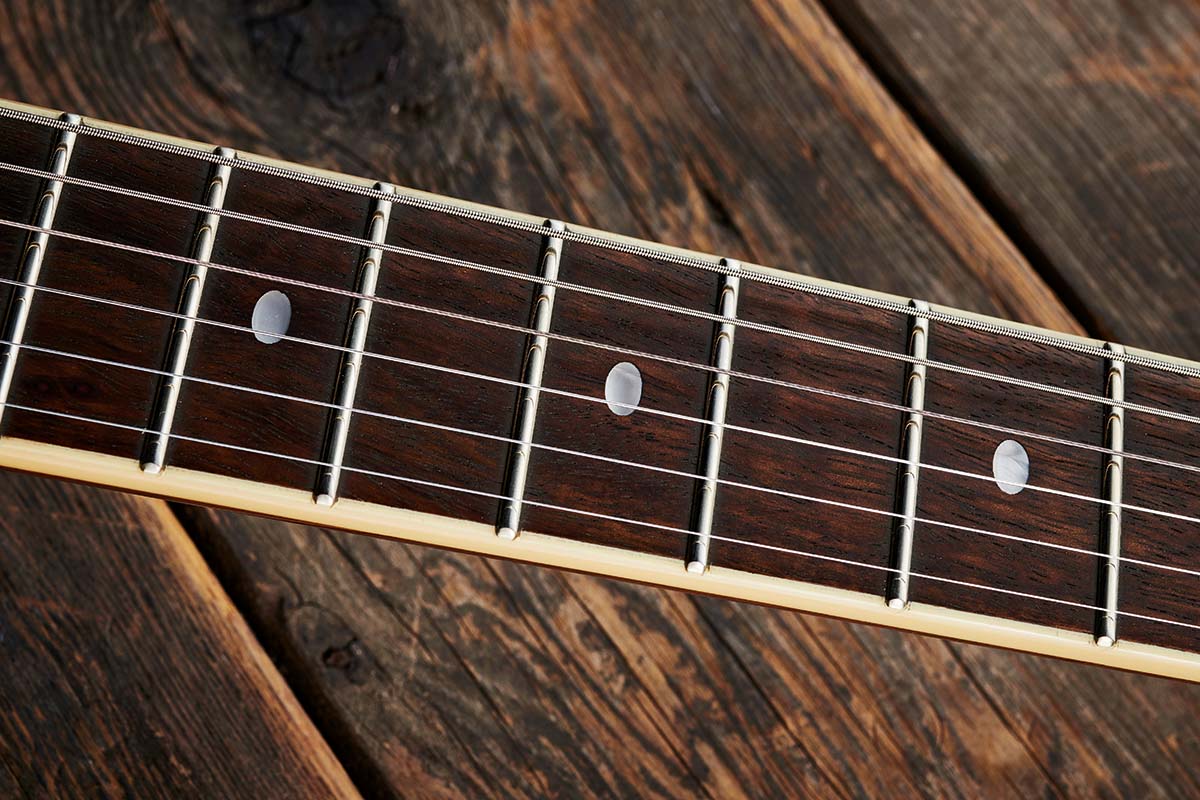
Pulling back the volume, while obviously decreasing the output (which is easily compensated for with a slight clean boost) does thin the sound a little, and picking close to the bridge in particular begins to get us into more classic Gretsch-y ballpark.
There’s quite a midrange honk compared with either of our references; with a bit of slapback and a hint of hair the bridge is a pretty authentic rockabilly voice, less thick and with that smooth-nosed punch. The mix is where the money lies for those bouncing rockabilly rhythms, of course, but, again, it’s a little thicker than you might expect.
The neck on its own sounds rounded and less raunchy than the bridge – it lightens up with volume reduction, while conversely with some overdrive its sounds become rather humbucking-like. Rather like many Gold Foils we’ve tried – both old and new – these FideliSonic 90s are hard to pin down: on the one hand they almost sound like a low-output humbucker with the tone rolled back a little, but the response is a little more single coil.
Adding a little more hair and a timed delay pushes us to rootsy Americana, that sort of Buddy Miller signature sound, and kicking in a gnarly Supro Drive we’re definitely into 60s garage-rock grainy and fuzzy grime – a direction that really does seem to suit both guitars.
The pickups are single coils, but pretty well behaved in terms of hum pickup, while the mix on both is hum-cancelling. The size of the guitars also informs what we hear. The bigger guitar feels roomier, quite loose-sounding, the smaller body a little more focused, and not surprisingly the larger 2622 edges into feedback more quickly when pushed.
Although the light weights suggest a hollowbody, the response is definitely more ‘semi’, but neither sound nor feel like a more solid ES-335-alike. Both guitars are great players. We’re more taken with the larger 2622 for a strapped-on gigging guitar, but, hey, that might be all that Gretsch conditioning over the past decades.
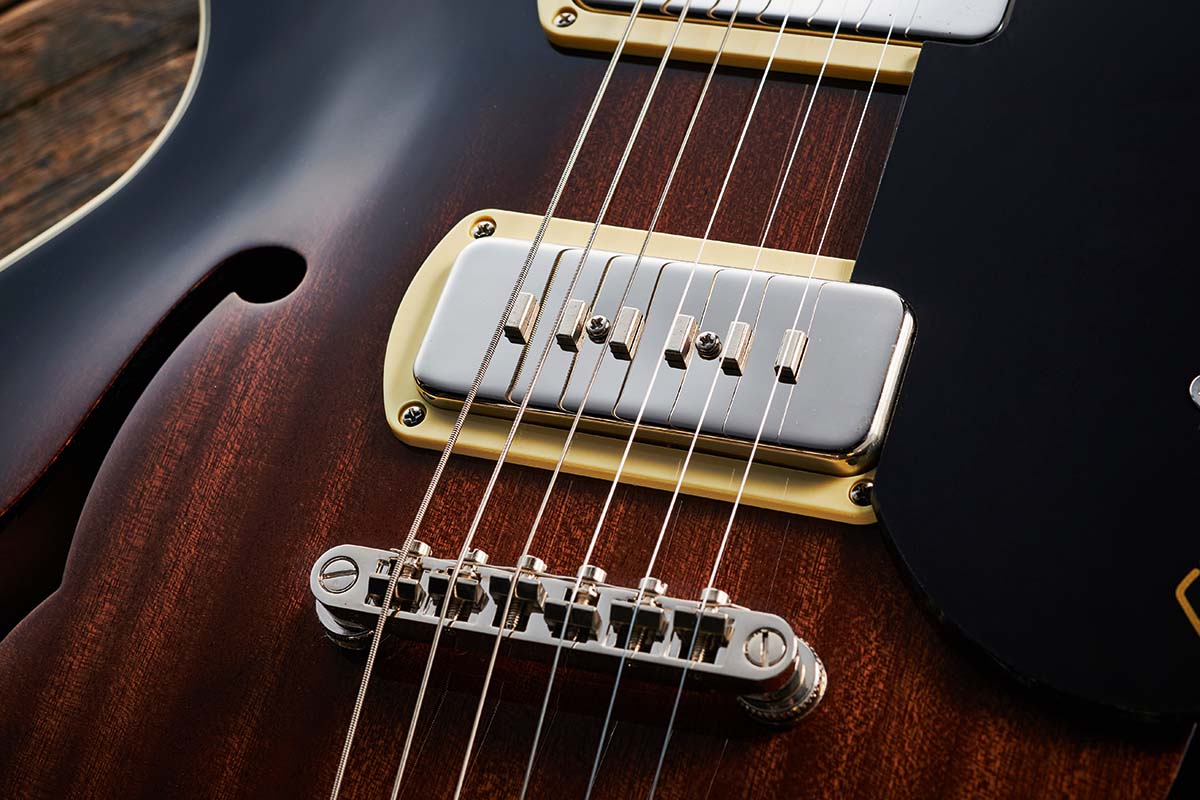
Verdict
We’ll put our hands up and say we’ve been big fans of Gretsch’s Streamliner range since its inception back in 2016. The combination of affordability, quality and (up to a point) broader appeal ticks all our boxes. Neither of these guitars changes that opinion, but we are a little surprised by their voicing.
The larger body 2622 especially veers dangerously close to being too smooth and mellow and, for some, simply not bright enough. Yet everywhere you look pickup makers are bringing back antiquated and often niche pickup designs – Gold Foils, Dynasonics and plenty more – and these FideliSonics might reference that shortlived Gibson P-90 staple style that’s already been revived by a few makers.
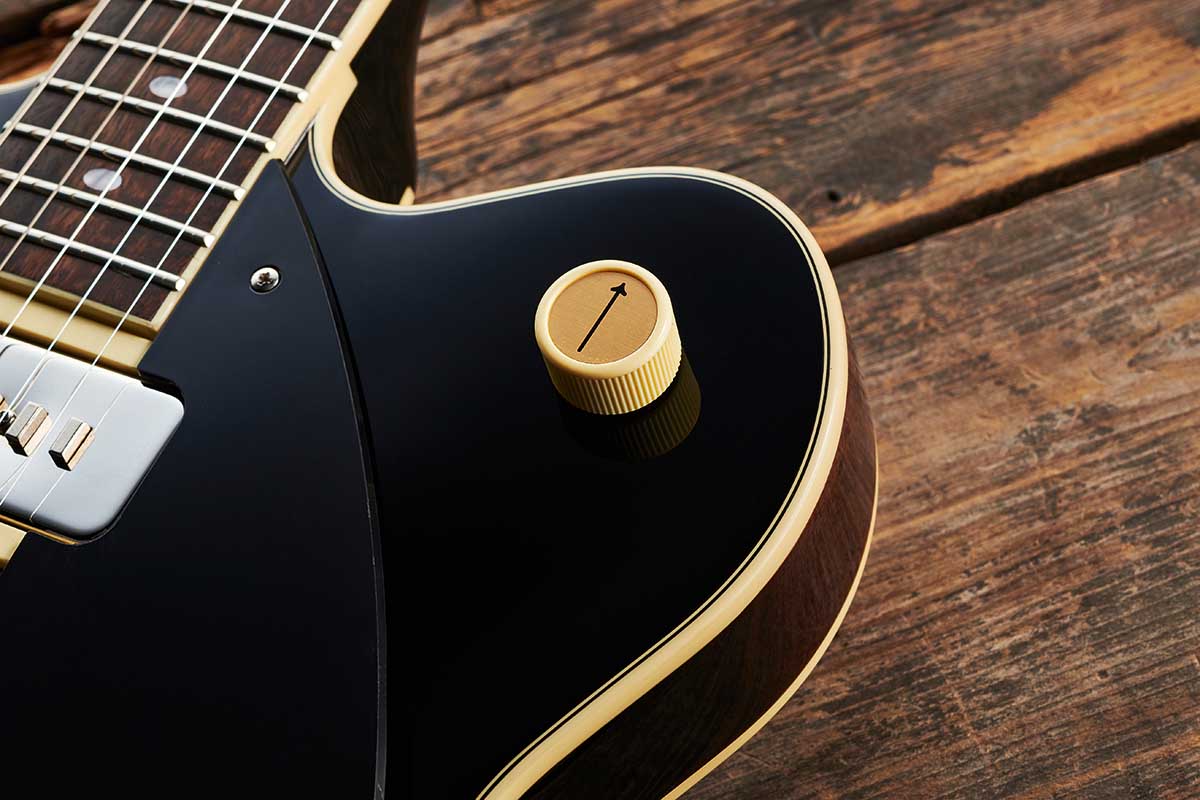
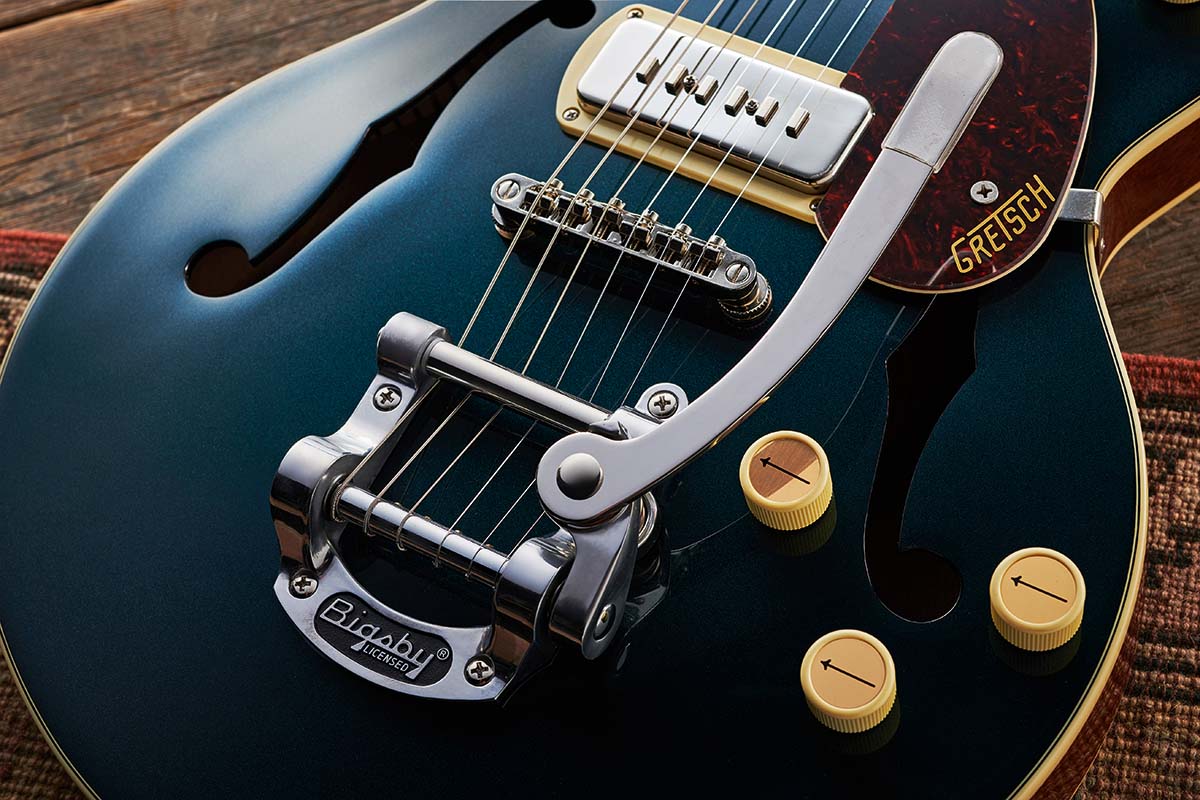
Nevertheless, they really have their own thing going on: the tone is round and smooth and quite rich, with a characterful midrange that works well with some grit and overdrive. Importantly, too, unlike some of those old-style pickups, these retain a regular P-90 footprint, which means pickup swaps are straightforward and adds to their modding appeal.
Would these be our first choice to nail those classic Gretsch tones of yesteryear? No, but you can get that in the Electromatic range. These very tidy-for-the-money lightweight thinlines move effortlessly from pretty jazzy sounding cleans to surprisingly muscular bluesy, rootsy grit with overdrive. Add in those Bigsbys and a little musical feedback and you’re off. Huge potential from a far from huge outlay.
Specs
Gretsch Streamliner G2622T-P90
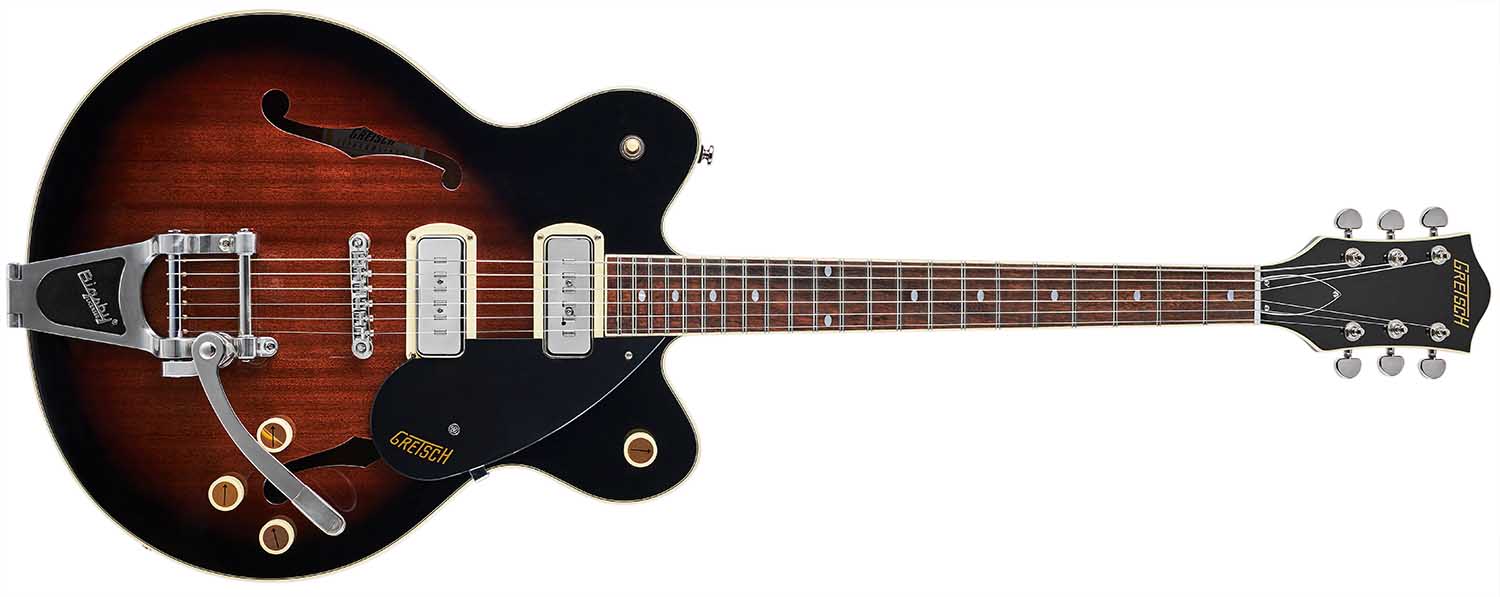
- PRICE: $599 / £609
- ORIGIN: Indonesia
- TYPE: Full-size double-cutaway centre-blocked semi electric
- BODY: Laminated mahogany back, top and sides w/ spruce centre-block
- NECK: Nato, Thin “U” pro le, glued-in
- SCALE LENGTH: 629mm (24.75”)
- NUT/WIDTH: Synthetic bone/43mm
- FINGERBOARD: Bound rosewood, pearloid oval inlays, 305mm (12”) radius
- FRETS: 22, small
- HARDWARE: Adjusto-Matic bridge, Bigsby B70 vibrato, die-cast tuners – nickel-plated
- STRING SPACING, BRIDGE: 52mm
- ELECTRICS: 2x FideliSonic 90 single coils, 3-position pickup selector toggle switch, master volume, master tone, individual pickup volume controls
- WEIGHT (kg/lb): 3.19/7.02
- OPTIONS: Available with V-Stoptail tailpiece (£539)
- RANGE OPTIONS: The standard G2622T with Broad’Tron humbuckers streets around £469
- LEFT-HANDERS: Not this model
- FINISHES: Brownstone (as reviewed) and Forge Glow with black pickguards, and Gunmetal with tortoise pickguard
Gretsch Streamliner G2655T-P90
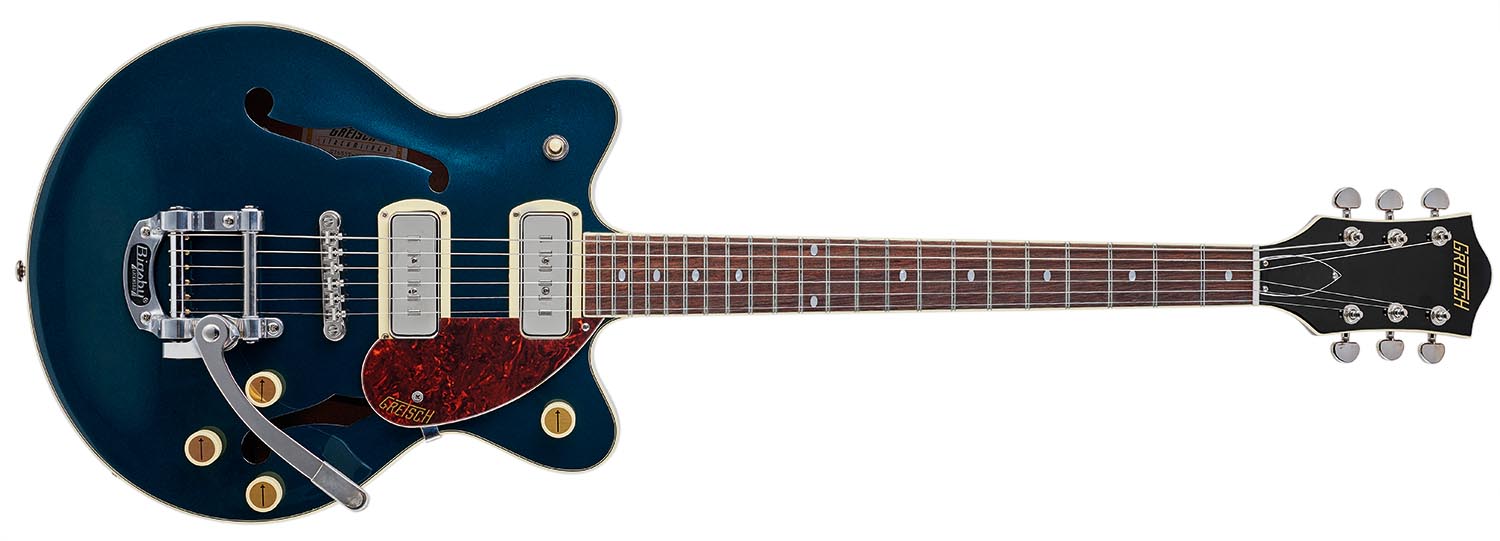
- PRICE: $599 / £609
- ORIGIN: Indonesia
- TYPE: Downsized double-cutaway centre-blocked semi electric
- BODY: Laminated mahogany back, top and sides w/ spruce centre-block
- NECK: Nato, Thin “U pro le, glued-in
- SCALE LENGTH: 629mm (24.75”)
- NUT/WIDTH: Synthetic bone/42.8mm
- FINGERBOARD: Bound laurel, pearloid oval inlays, 305mm (12”) radius
- FRETS: 22, medium
- HARDWARE: Adjusto-Matic bridge, Bigsby B50 vibrato, die-cast tuners – nickel-plated
- STRING SPACING, BRIDGE: 52mm
- ELECTRICS: 2x FideliSonic 90 single coils, 3-position pickup selector toggle switch, master volume, master tone, individual pickup volume controls
- WEIGHT (kg/lb): 2.85/6.27
- OPTIONS: Available with V-Stoptail tailpiece (£539)
- RANGE OPTIONS: The standard G2655T with Broad’Tron humbuckers streets around £469
- LEFT-HANDERS: Not this model
- FINISHES: 3x gloss 2-tone colours with tortoise pickguards – Midnight Sapphire (as reviewed), Mint Metallic and Mint Metallic tops all with and Vintage Mahogany Stain back, sides and neck back
- CONTACT: Gretsch Guitars

Dave Burrluck is one of the world’s most experienced guitar journalists, who started writing back in the '80s for International Musician and Recording World, co-founded The Guitar Magazine and has been the Gear Reviews Editor of Guitarist magazine for the past two decades. Along the way, Dave has been the sole author of The PRS Guitar Book and The Player's Guide to Guitar Maintenance as well as contributing to numerous other books on the electric guitar. Dave is an active gigging and recording musician and still finds time to make, repair and mod guitars, not least for Guitarist’s The Mod Squad.
